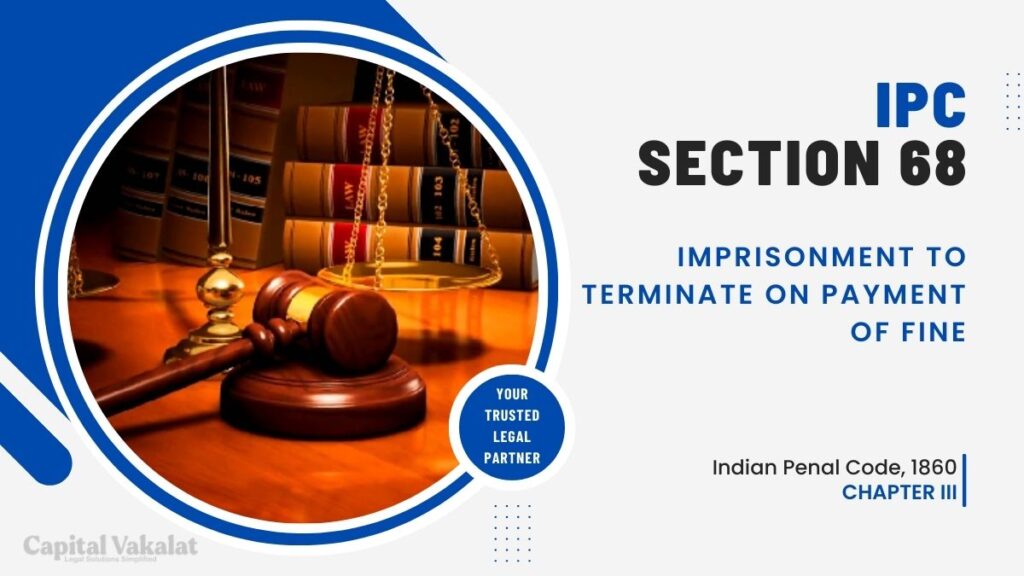In the vast realm of legal provisions, Section 68 of the Indian Penal Code (IPC) stands as a notable clause that pertains to the termination of imprisonment upon the payment of a fine.

This article delves into the intricacies of Section 68 IPC, exploring its significance, legal implications, and practical application.
Understanding Section 68 IPC
Section 68 IPC, a vital component of the Indian Penal Code, was established with the intention of providing relief to individuals facing imprisonment for non-payment of fines imposed as part of their criminal sentence. It offers a glimmer of hope to those who find themselves trapped in the clutches of imprisonment due to financial constraints.
The Legal Basis
Historical Context
To comprehend Section 68 IPC fully, it’s imperative to delve into its historical context. This section has its roots in the colonial-era laws that governed India during British rule.
Imprisonment as a Last Resort
Section 68 IPC embodies the principle that imprisonment should be the last resort for individuals who are unable to pay their fines. It emphasizes the Indian legal system’s commitment to ensuring that punishment aligns with the gravity of the offense committed.
Operation of Section 68 IPC
Procedure for Application
When an individual is unable to pay the prescribed fine, they can apply for relief under Section 68 IPC. The process involves filing an application before the appropriate court, explaining the inability to pay the fine.
Court Discretion
The court, upon receiving the application, exercises its discretion to determine whether the applicant genuinely lacks the means to pay the fine. This discretion ensures that the provision is not misused.
Impact on Justice System
Reducing Overcrowding
One of the most significant advantages of Section 68 IPC is its potential to reduce overcrowding in prisons. By allowing individuals to pay fines instead of serving time in jail, it helps maintain a balance in the criminal justice system.
Promoting Rehabilitation
Imposing fines as an alternative to imprisonment encourages individuals to take responsibility for their actions. It can be seen as a more rehabilitative approach to justice.
Challenges and Concerns
Potential for Abuse
While Section 68 IPC is a vital legal tool, there is a concern that it could be abused by individuals who can afford to pay but choose not to. Striking a balance between providing relief and preventing misuse is a delicate task.
Inequities in Application
In some cases, the application of Section 68 IPC may lead to inequalities, as the court’s discretion can vary. Ensuring consistent application remains a challenge.
Conclusion
In conclusion, Section 68 IPC serves as a beacon of hope for individuals entangled in the legal web due to their inability to pay fines. It reflects the Indian legal system’s commitment to fairness and rehabilitation. However, it also poses challenges that require careful consideration. Striking a balance between providing relief and upholding the law’s integrity is a crucial task for the justice system.
This article has explored the nuances of Section 68 IPC, shedding light on its historical roots, legal operation, and impact on the justice system. It’s a provision that seeks to strike a balance between punishment and rehabilitation, ensuring that justice is not only served but also tempered with humanity.
FAQs
What happens if the court finds that an applicant can afford to pay the fine?
In such cases, the court may reject the application, and the individual will have to serve the stipulated imprisonment.
Is Section 68 IPC applicable only to Indian citizens?
No, it applies to all individuals subject to the Indian legal system, irrespective of nationality.
Can the court order a reduced fine amount under Section 68 IPC?
Yes, the court has the discretion to reduce the fine amount if it deems it appropriate.
Is there a time limit for applying under Section 68 IPC?
While there is no strict time limit, it is advisable to apply as soon as possible after sentencing.